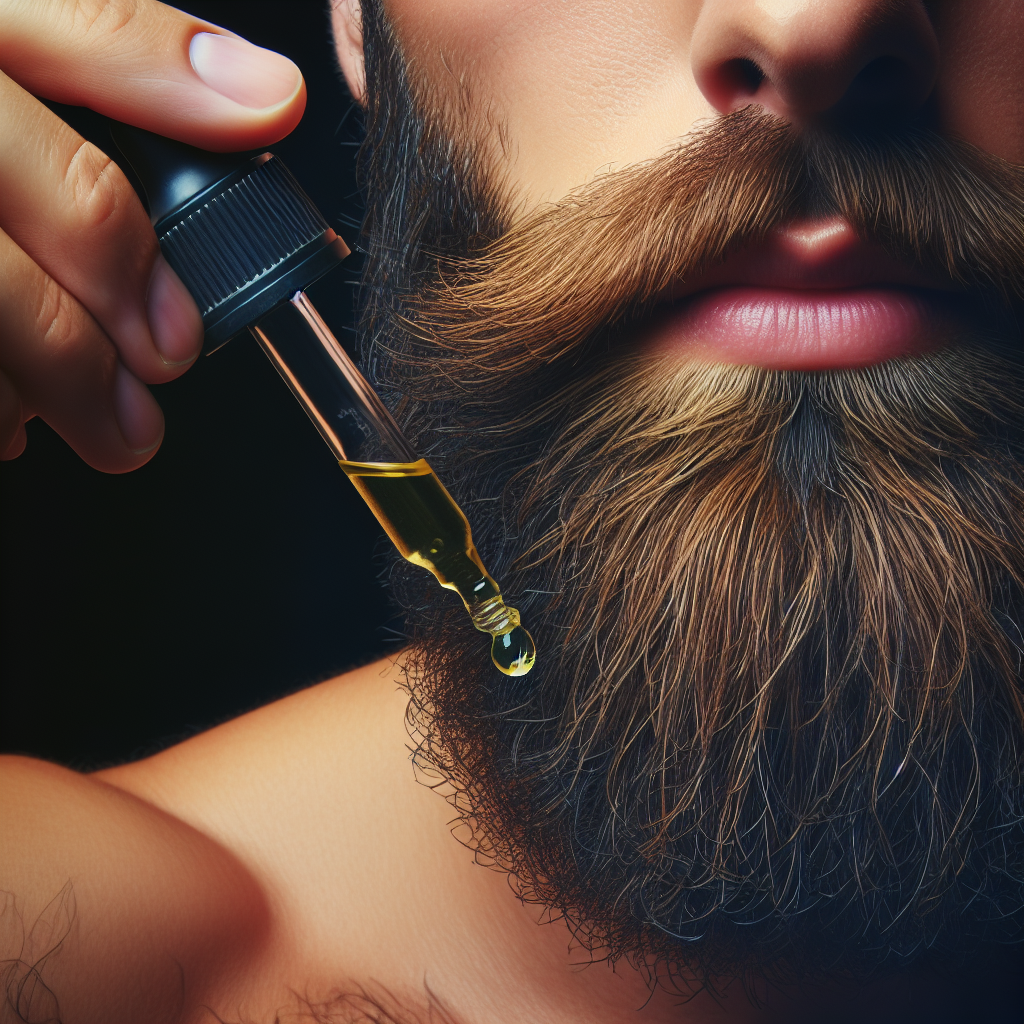If you’ve yearned for a fuller, thicker beard and have heard whispers about the wonders of castor oil, you’re not alone. The question on the lips of many aspiring beard enthusiasts is simple: does castor oil really promote beard growth? As with any popular remedy, it’s important to separate fact from fiction. In this article, you’ll discover the truth behind this age-old belief, unraveling the science, and uncovering the potential benefits of using castor oil to unlock the beard of your dreams. Get ready to unveil the secrets of this natural wonder and take your facial hair game to new heights!
The Science of Beard Growth
Hair Growth Cycle
Before delving into the details of how castor oil affects beard growth, it is important to understand the natural hair growth cycle. Hair growth occurs in cycles, comprising the anagen, catagen, and telogen phases. The anagen phase is the active growth phase, during which the hair follicle produces new hair. This phase can last for several years, thus determining the maximum potential length of the hair. The catagen phase is a transitional phase when the hair follicle regresses, and the hair stops growing. Finally, the telogen phase is a resting phase when the hair follicle remains dormant before the hair is shed and a new hair starts growing in its place.
Factors Affecting Beard Growth
Various factors influence the growth of beard hair. Genetics play a significant role, as they determine the presence or absence of facial hair follicles and the distribution of hair density. Hormones are another critical factor, with testosterone being the primary hormone responsible for initiating and promoting beard growth. Age, lifestyle choices, nutrition, and overall health also contribute to the rate and quality of beard growth.
Understanding Castor Oil
Castor Oil Composition
Castor oil is derived from the seeds of the castor plant (Ricinus communis) through a process known as cold pressing. The oil is rich in essential fatty acids, specifically ricinoleic acid, which constitutes approximately 85-95% of the oil. Additionally, castor oil contains triglycerides, vitamins, and minerals that contribute to its potential benefits for hair growth.
Properties of Castor Oil
One of the key properties of castor oil is its ability to penetrate deep into the hair follicles and moisturize the hair from within. This not only helps nourish the hair but also promotes improved hair strength and elasticity. Castor oil also possesses antimicrobial properties that can help combat potential scalp infections. Furthermore, the high concentration of fatty acids in castor oil makes it an excellent emollient, providing hydration and softness to both the hair and the skin.

Claims About Castor Oil and Beard Growth
The Myth of Castor Oil as a Miracle Solution
While castor oil has gained popularity as a promising solution for promoting beard growth, it is essential to dispel the myth that it is a magical cure-all remedy. Beard growth is primarily determined by genetic and hormonal factors, and no topical application, including castor oil, can alter those underlying factors. Therefore, it is important to approach the claims surrounding castor oil with a realistic and informed perspective.
Anecdotal Evidence and Stories
Many individuals swear by the effectiveness of castor oil in promoting beard growth, citing their personal experiences and anecdotal evidence. However, it is crucial to recognize that personal anecdotes are not scientifically valid evidence. The placebo effect and confirmation bias can significantly influence subjective experiences, leading individuals to perceive changes that may not be scientifically supported. Therefore, while individual stories can be compelling, they should be considered with caution until supported by rigorous scientific research.
Scientific Research on Castor Oil’s Effect on Beard Growth
Limited Studies and Evidence
Despite the widespread claims about castor oil’s effectiveness in beard growth, scientific research on this specific topic is limited. Most studies focus on general hair growth rather than beard growth specifically. Consequently, the available evidence is not sufficient to conclusively support or refute the claims surrounding castor oil’s impact on beard growth. More rigorous scientific studies are needed to provide a clearer understanding of the relationship between castor oil and beard growth.
Exploring the Potential Mechanisms
Some studies have explored the potential mechanisms through which castor oil could potentially influence hair growth. Ricinoleic acid, the primary component of castor oil, has been found to possess anti-inflammatory properties and the ability to enhance blood circulation. These properties could theoretically contribute to a healthier scalp environment, potentially facilitating hair growth. However, further research is required to validate and expand on these preliminary findings.

Benefits of Castor Oil for the Beard
Moisturizing Properties
One of the key benefits of castor oil for beard care is its moisturizing properties. Dry and brittle facial hair can be a hindrance to beard growth, leading to breakage and a lackluster appearance. Applying castor oil to the beard can help nourish and hydrate the hair, making it softer, shinier, and more manageable. By moisturizing the beard hair, castor oil may indirectly support healthier growth.
Enhancing Hair Strength
In addition to moisturizing properties, castor oil can also enhance the strength of beard hair. The fatty acids present in castor oil can help fortify the hair shaft, reducing the risk of breakage and promoting overall hair health. Stronger hair strands are more likely to withstand the challenges of daily grooming routines and external stressors, supporting better beard growth over time.
Preventing Itchiness and Dandruff
Beard itchiness and dandruff are common issues that can hinder beard growth progress. The moisturizing and antimicrobial properties of castor oil make it a potential solution for these problems. By keeping the skin beneath the beard adequately hydrated and combating potential infections, castor oil can help alleviate itchiness and reduce the occurrence of dandruff. This creates a healthier environment for the beard to thrive, potentially enhancing growth in the long run.
Application Methods and Tips
Choosing the Right Castor Oil Product
When selecting a castor oil product for beard application, it is important to choose one that is cold-pressed, organic, and free from additives or artificial fragrances. This ensures the oil retains its natural properties and minimizes the risk of irritation or adverse reactions. Additionally, considering the viscosity of the oil is crucial, as thicker oils may require dilution for ease of application. Ultimately, finding a high-quality castor oil product that meets personal preferences and needs is key.
Proper Application Techniques
To effectively apply castor oil to the beard, it is recommended to start with a clean, dry beard. Using a dropper or applying a small amount of oil to the fingertips, gently massage the oil into the beard, ensuring even distribution from the roots to the tips. For longer beards, a beard comb or brush can be used to further distribute the oil. It is crucial to remember that consistency is key, so regular and thorough application is necessary to potentially achieve the desired benefits.
Frequency and Timeframe
The ideal frequency of castor oil application may vary from individual to individual, and experimentation may be necessary to determine what works best. As a general guideline, applying a few drops of castor oil to the beard two to three times per week should be sufficient. It is important to avoid excessive application, as this can lead to product buildup, greasiness, and potential skin irritation. Patience is also vital, as visible improvements in beard growth may take several weeks or even months to manifest.
Considerations and Potential Side Effects
Allergies and Sensitivities
While castor oil is generally considered safe for topical use, it is essential to be aware of potential allergies or sensitivities. Performing a patch test on a small area of skin, such as the inner forearm, is advisable before applying castor oil to the entire beard. If any signs of redness, itching, or irritation occur, it is best to discontinue use and consult a healthcare professional. Additionally, individuals with known allergies to castor oil or its constituents should avoid using it.
Risks of Excessive Application
Using excessive amounts of castor oil or applying it too frequently can lead to unintended consequences. Excessive oil buildup can clog the hair follicles, potentially resulting in folliculitis or other skin infections. Moreover, an overly greasy beard can be unappealing and challenging to maintain. Therefore, moderation and adhering to the recommended application guidelines are crucial to minimize potential side effects.
Alternative Solutions for Beard Growth
Dietary and Nutritional Considerations
While castor oil may offer potential benefits for beard growth, it is important to recognize that beard growth is influenced by various factors beyond topical applications. The role of diet and nutrition in promoting healthy hair growth should not be overlooked. Consuming a balanced diet rich in vitamins, minerals, and protein can support overall hair health, including beard growth. Additionally, staying adequately hydrated and avoiding excessive stress can contribute to optimal beard growth conditions.
Lifestyle Factors
Lifestyle choices can also impact beard growth. Prioritizing good quality sleep, minimizing exposure to excessive heat or abrasive grooming practices, and managing stress levels effectively can all contribute to the maintenance and improvement of beard growth. Maintaining a healthy lifestyle overall can create a favorable environment for optimal hair growth, including the beard.
Medical Options
In some cases, individuals may experience challenges with beard growth that warrant medical intervention. If concerns persist despite using various beard growth strategies, it may be prudent to consult a dermatologist or healthcare professional specializing in hair health. They can assess the underlying causes and recommend appropriate medical options, such as hormonal therapies or surgical interventions, if necessary.
Final Verdict on Castor Oil’s Effectiveness for Beard Growth
Summary of Findings
While castor oil has gained popularity as a potential solution for promoting beard growth, the scientific evidence to support these claims is limited. The moisturizing, strengthening, and antimicrobial properties of castor oil suggest that it may have benefits for beard health. However, it is crucial to manage expectations and recognize that castor oil cannot alter genetic or hormonal factors that dictate beard growth. Individual experiences may vary, and further research is needed to provide a more definitive verdict on its effectiveness.
Personal Experiences and Testimonials
Many individuals have reported positive experiences and anecdotal evidence supporting the use of castor oil for beard growth. However, it is important to consider that personal experiences can be subjective and influenced by various factors, including the placebo effect. While personal testimonials can provide insights, they should be approached with caution and not solely relied upon as scientific evidence.
Final Thoughts
In conclusion, castor oil’s potential benefits for beard growth should not be dismissed entirely. Its moisturizing properties, ability to enhance hair strength, and potential for preventing itchiness and dandruff make it a viable option for beard care. However, it is important to approach the claims with realistic expectations, recognizing the limitations of current scientific research. Combining the use of castor oil with a holistic approach to beard care, including proper nutrition and lifestyle choices, may yield the best results. Ultimately, individual experimentation and personalized approaches may be necessary to determine the most effective strategies for promoting beard growth.
